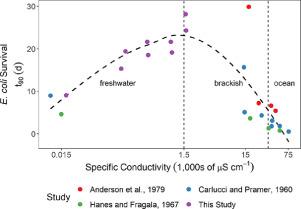Water Research ( IF 11.4 ) Pub Date : 2021-01-07 , DOI: 10.1016/j.watres.2021.116812 Stephen E. DeVilbiss , Meredith K. Steele , Leigh-Anne H. Krometis , Brian D. Badgley

|
Elevated levels of Escherichia coli (E. coli) are responsible for more designated freshwater stream impairments than any other contaminant in the United States. E. coli are intentionally used as a sentinel of fecal contamination for freshwaters because previous research indicates that salt concentrations in brackish or marine waters reduce E. coli survival, rendering it a less effective indicator of public health risks. Given increasing evidence of freshwater salinization associated with upland anthropogenic land-use, understanding the effects on fecal indicators is critical; however, changes in E. coli survival along the freshwater salinity range (≤ 1500 µS cm−1) have not been previously examined. Through a series of controlled mesocosm experiments, we provide direct evidence that salinization causes E. coli survival rates in freshwater to increase at conductivities as low as 350 µS cm−1 and peak at 1500 µS cm−1, revealing a subsidy-stress response across the freshwater-marine continuum. Furthermore, specific base cations affect E. coli survival differently, with Mg2+ increasing E. coli survival rates relative to other chloride salts. Further investigation of the mechanisms by which freshwater salinization increases susceptibility to or exacerbates bacterial water quality impairments is recommended. Addressing salinization with nuanced approaches that consider salt sources and chemistry could assist in prioritizing and addressing bacterial water quality management.
中文翻译:

淡水盐化可提高大肠杆菌的存活率和细菌受损的风险
与美国任何其他污染物相比,高水平的大肠杆菌(E. coli)导致更多的指定淡水流损害。大肠杆菌被故意用作淡水的粪便污染标记,因为先前的研究表明,咸淡水或海水中的盐浓度会降低大肠杆菌的存活率,从而使其成为降低公共卫生风险的有效指标。鉴于越来越多的证据表明与陆地人为土地使用有关的淡水盐渍化,了解对粪便指标的影响至关重要。然而,沿淡水盐度范围(≤1500 µS cm -1)的大肠杆菌存活率变化)之前未经检查。通过一系列受控的中观宇宙实验,我们提供了直接的证据表明盐碱化导致淡水中的大肠杆菌存活率在电导率低至350 µS cm -1时增加,并在1500 µS cm -1时达到峰值,从而揭示了整个过程中的补贴-压力响应。淡水海洋连续体。此外,特定的碱基阳离子影响大肠杆菌存活不同,有Mg 2+增加大肠杆菌相对于其他氯化物盐的存活率。建议进一步研究淡水盐碱化增加对细菌水质损害的敏感性或加剧细菌水质损害的机制。用细微入微的方法解决盐碱化问题,这些方法应考虑盐源和化学成分,可帮助确定优先级并解决细菌水质管理问题。









































 京公网安备 11010802027423号
京公网安备 11010802027423号